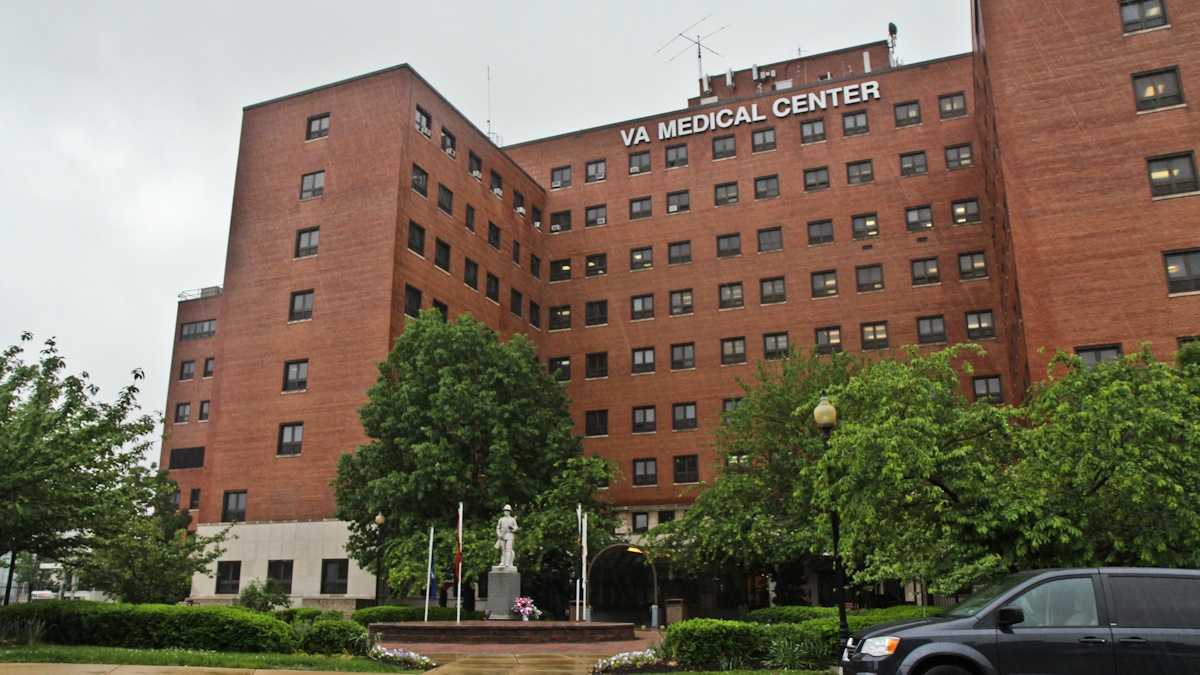VA taking back work of helping formerly homeless vets
Listen
Philadelphia's Veterans Affairs Medical Center (Kim Paynter/WHYY)
Just before Christmas, former Philadelphia Mayor Michael Nutter made the startling declaration that veteran homelessness had been “effectively ended” in Philadelphia, during a speech at City Hall.
Yet just days later, the Department of Veterans’ Affairs quietly ended a three year, $1.5 million partnership it had with a nonprofit called Pathways to Housing, a group that had assisted many of the city’s most troubled homeless vets find housing.
Even more importantly, the group had helped hundreds of chronically-homeless veterans stay housed. Many homeless men struggle with the transition from life on the streets to life in an apartment, and feelings of loneliness or hopelessness as they rebuild their lives. A lack of support can land people back in a cycle of destructive behavior and back on the streets.
That’s what Pathway’s client Gary Core said, in a tearful interview last week. Core was recently notified, along with 123 other clients, that he would be saying goodbye to the caseworkers he had known for the last three years.
“This is very chaotic for me, because it’s like losing my family,” he said. “It’s devastating for that kind of happiness to just be snatched from you after being given to you for so long.”
Core, a 62-year-old Vietnam vet, had been living on the streets of Southwest Philadelphia for years, battling drug addiction. He was seeing social workers at the VA who eventually referred him — and many of the agency’s most difficult cases — to Pathways in 2011 as part of a trial program in combating homelessness.
Caseworkers at Pathways helped him find an apartment, get counseling and relearn basic life skills, like grocery shopping or managing personal finances. Although Core says there was a more important part of his relationship with his caseworkers at Pathways.
“They taught me and showed me that you’re not alone,” he said. “And that was the most important thing, because I’d been alone for so long.”
Core has been in his apartment and off drugs ever since. In the past four years, the group has placed more than 400 homeless veterans and has become a national model for homeless support, emulated by the VA itself. But a few days before Christmas, Pathways was abruptly notified that its remaining 124 clients would be transferred back to the city’s main VA medical center.
A spokesperson for the VA said the agency had determined it could provide homeless support internally, at a lower cost.
“The changes are within the scope of the current contract,” said VA spokesperson Jennifer Askey. “The [Philadelphia VA] is in the process of implementing a thoughtful and comprehensive transition to ensure veterans continue to receive the level of services needed. Many of the veterans currently served by Pathways to Housing will work with Medical Center staff members they already know.”
But both Core and Samantha Leader, a caseworker at Pathways, expressed concern that the VA won’t provide the level of care that helped their clients succeed.
“We have about three to four case managers on each team, we have a nurse, a certified peer specialist, a team leader, assistant team leader and a program assistant. We also have a doctor and psych on staff and all of us work together with the clients as a team model,” said Leader. “At the VA you’re assigned one caseworker.”
A recent National Institutes of Health study found that the average VA social worker was assigned between 25 and 35 homeless clients. Leader said her nonprofit’s ratio is 10-to-1.
The veterans enrolled at Pathways will be headed back to the VA by April — they won’t have a choice. Core will keep his apartment, but says it feels like he’s “starting over.”
WHYY is your source for fact-based, in-depth journalism and information. As a nonprofit organization, we rely on financial support from readers like you. Please give today.

